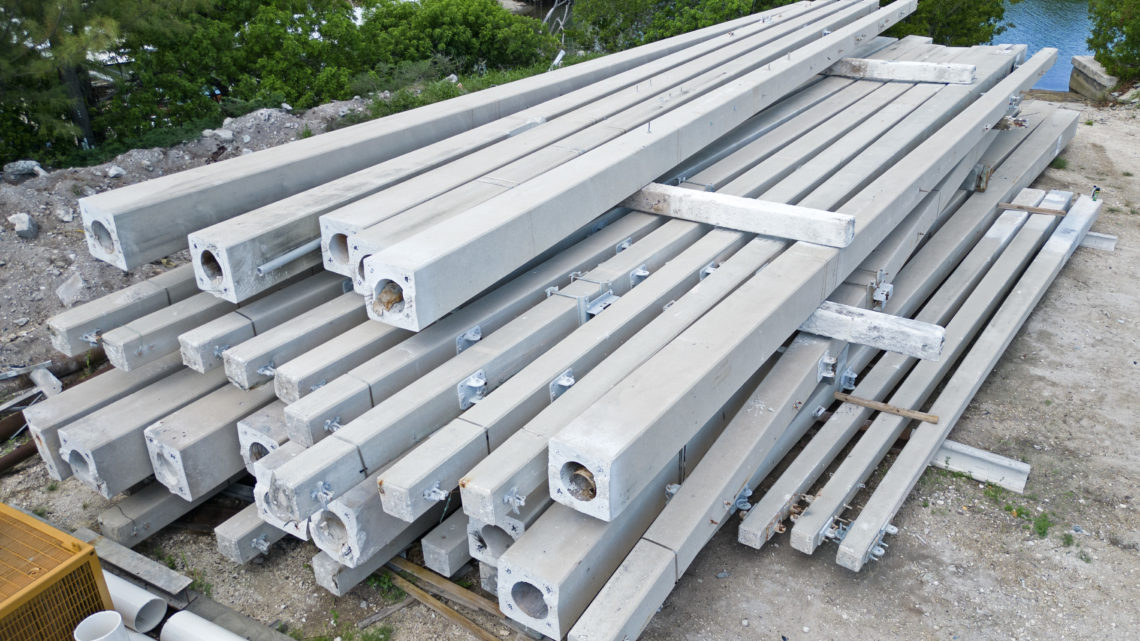Decommissioned FKEC Electric Poles Saved for Artificial Marine Habitat Projects
ISLAMORADA, Florida Keys — Some 37 concrete electric utility poles that once stood about 55 feet high above the ground and were recently removed from the Sea Oats Beach region in Islamorada, along the Florida Keys Overseas Highway, are destined to be repurposed as new artificial marine habitats off the Florida Keys.
The poles, originally installed in a several-mile line on the ocean side of the highway, once carried the main transmission line for the Florida Keys Electric Cooperative. However, after more than 40 years of use, the harsh marine environment had taken its toll and a replacement and relocation program was in order.
The almost two-year replacement program features new, spun-concrete transmission poles installed on the bay side of the highway. It cost almost $8 million and was 75 percent funded by a FEMA Mitigation Grant, according to FKEC CEO Scott Newberry.
Meanwhile, the old poles were originally to be ground and trucked to a mainland landfill, but an effort evolved to save them for potential use as artificial reefs. Discussions were initiated between the co-op, Monroe County and Florida Fish and Wildlife Conservation Commission officials.
“Florida Keys Electric Cooperative strives to protect and preserve the unique Florida Keys environment in all the projects we undertake,” Newberry said, adding that the co-op contributed $42,550 to the project that it saved from not having to dispose of the old poles. “We are pleased to work with Monroe County to repurpose the transmission poles into new habitat that will benefit marine life and provide a new attraction to residents and visitors alike.”
According to FWC officials, sinking the power poles could take between one and three years due to the need for surveying locations and various permits.
Florida Keys National Marine Sanctuary officials have no near-term plans to permit artificial marine habitats in sanctuary waters, according to Superintendent Sarah Fangman.
Monroe County Administrator Roman Gastesi said that if the county is not able to procure a permit from the sanctuary, there are locations outside sanctuary boundaries that could likely be used with permitting from the Army Corp of Engineers and other agencies.
But Gastesi noted the best part is that Florida Gov. Ron DeSantis recently signed off on a bill providing $10 million “in nonrecurring funds from general revenue to FWC for the purpose of establishing and implementing a framework for the placement, monitoring and maintenance of artificial habitat in Monroe County.”
“The hardest part of this kind of this type of program is getting the money,” Gastesi said. “We have the money.
“Now we need to put a comprehensive artificial reef program together that would go way beyond just the FKEC poles.”
Gastesi said he is communicating with other coastal counties as well as FWC officials for guidance.
The effort to help secure state funds for Monroe County artificial marine habitats was fostered by Robert Spottswood, Jr., president of Key West-based Spottswood Companies.
“We’ve been blessed with the opportunity to establish an artificial reef program in the Keys,” Spottswood said. “This will be of great benefit to our environment, residents and our tourism-centered economy, which is based largely on our surrounding waters.”
Spottswood lauded Florida Sen. Ben Albritton, the senate majority leader, who championed funding for Monroe County.
“What’s really nice is that our legislators understand that our fishery resources are not only important to Monroe County, but they are critical for the rest of the state and nation,” Spottswood said. “Legislators from other parts of the state are listening to local communities and are making a difference.”
Officials at FWC seem eager to assist Monroe County with creating more artificial marine habitats.
“FWC looks forward to working with Keys partners to develop a diverse artificial reef program for Monroe County,” said Keith Mille, the artificial reef program administrator for the FWC Division of Marine Fisheries Management. “We want to help the Keys carefully identify locations and appropriate materials to achieve multiple objectives that benefit anglers and divers.
“Artificial reefs can maximize ecological benefits that help achieve fisheries management goals,” he said.
Spottswood said the old FKEC power poles, weighing about 20,000 pounds each with dimensions that average two feet by two feet at the base and one by one foot at the top, are worth setting aside for future use.
“We get a couple of benefits,” he said. “They’re expensive to discard and truck them out of the county, but more important they can be repurposed to help us.
“It’s a win-win for everyone,” he said.
[livemarket market_name="KONK Life LiveMarket" limit=3 category=“” show_signup=0 show_more=0]





No Comment